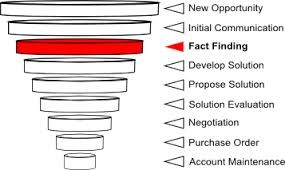Guaranteed Better Sales Discovery
 By Michael Griego
By Michael Griego
A big issue I see over and over again, with even sophisticated sales teams, is the tendency to rush through the “discovery” phase of their selling process. It’s not that “discovery calls” are not being done, that’s actually the rub. They are being done, though not as effectively as they should. And the sales rep knows it, but cannot resist the enticing request of the prospect/customer pulling him/her into the next step “demo” or the “trial” or the “proposal.”
After all, why not proceed toward an even shorter sales cycle?
Actually, big mistake.
Some companies request our help to develop their sales teams to be “better closers.” I tell them they do not have a “Closing” problem; they have a Qualifying/Discovery problem way back in the earlier stages of their sales process. You can bet that if a deal is stalling, going sideways, or not “closing” the problem is invariably in something or someone that should have been discovered long ago in previous sales calls.
But the sales rep got pulled forward by an eager customer and did not have the discipline to control the sales cycle and properly maneuver the call and the prospect. The result is a growing pipeline of riff-raff deals that will drive your forecasting accuracy down into ground.
OK, So What Do You Do?
The key is to instill good and effective sales cycle management through real clarity in your sales process. Particularly in your Discovery or Qualification stages. This can be driven at the Opportunity level in your CRM to remind/direct the rep to park a bit at this stage (it might take multiple sales conversations before proceeding to the next stages). At a minimum the reps should be taught/reminded to “not pass the line” (drawn between Discovery and whatever you may call the Solution Development or even Demonstration or Proposal stage for simpler environments.)
This discipline should be highlighted in your weekly sales rep Pipeline/Forecast review calls to reinforce the good practice of thorough Discovery and Qualification.
Additionally, key Discovery and Qualification Questions should be delineated and emphasized to keep reps from developing poor habits and deluding themselves with sales conversations that miss the mark in drawing out key chunks of information that will help guide and direct them as they maneuver through that particular account opportunity.
But It Seems So Obvious
Of course it does, but sales teams today are filled with the young and impatient and the old and the restless. Or put another way, the young and the untrained, and the old and the sloppy. All of us veteran reps have been there. We’re so comfortable in sales calls that we sometimes give short shrift to best practices that we used to do in our younger years but now sometimes gets lost in the shuffle of the professional sales call.
Good News
The good news here is that it’s a relatively easy fix. It does require self-awareness and critical perception of your practices, whether an individual or across a team you may manage. Easier to change-manage yourself than a whole sales organization. And it’s not overnight. We take weeks to assess, define, document and then instill across the sales team. Even better when we “institutionalize” the good behavior into Salesforce.com or your CRM of choice.
You can take it to the bank though: when it comes to Sales Discovery there is a better way.

